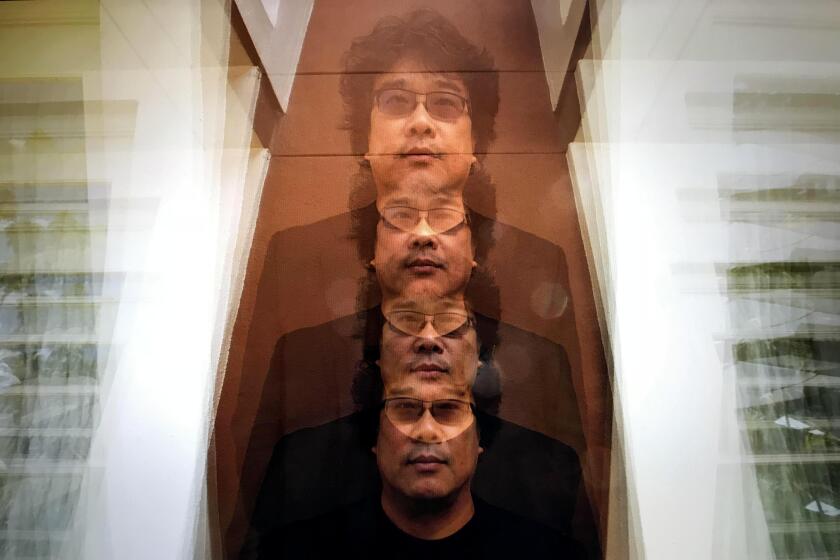‘Parasite’ director Bong Joon Ho makes Oscars history with win

A historic best director Oscar goes to ‘Parasite’ filmmaker Bong Joon Ho, the first Korean winner and only the second director to win the prize for a film not in English.
- Share via
The Korean class satire “Parasite” came into the 2020 Academy Awards with a historic six nominations. Sunday night in Hollywood, filmmaker Bong Joon Ho left with a history-making win of his own: best director.
“1917” filmmaker Sam Mendes had swept the directing prizes at the Golden Globes, Directors Guild Awards and BAFTAs. But after becoming the first foreign film to win the Screen Actors Guild ensemble prize, “Parasite” nabbed Bong his first directing Oscar, capping an awards run that began in May when the film became the first South Korean entry to win the Palme d’Or at Cannes.
‘Parasite’ director Bong Joon Ho on the acclaim, awards and expectations that have people buzzing about his twisty, masterful new thriller.
The idea for “Parasite” came to Bong years ago before he and co-writer Han Jin Won, both also winners for original screenplay, wrote the twisty genre-bender.
“I think even the most mundane of daily aspects, of individuals, all carry a political-social context with them,” he told The Times last fall of the small but loaded gesture at the center of “Parasite”s irrevocable chain of events: a wealthy man turns up his nose at the smell of his driver.
The film follows the poor Kim family (Song Kang Ho, Chang Hyae Jin, Choi Woo Shik and Park So Dam) as they ingratiate themselves into the employ of the wealthy Parks (Lee Sun Kyun and Cho Yeo Jeong) in a con that escalates into class warfare. “Parasite” marks Bong’s seventh feature film to date and his first fully Korean-made film since 2009’s “Mother.”
As “Parasite” made its way through the awards-season gauntlet collecting film festival laurels and critical kudos, its position as an Oscars heavyweight came increasingly into focus. Despite the challenges that face foreign-language entries in breaking through to main categories, the international box office hit became an awards favorite as audiences braved the “1-inch-tall barrier” of reading subtitles and flocked to the film.
Bong earned his own fan following, dubbed the #BongHive, frequently shared the spotlight with his cast and crew and fellow filmmakers, and gave one charming speech after another on the road to Oscar. Among the six “Parasite” Oscar nominations, Bong received nods for directing, screenplay and as producer, with Kwak Sin Ae, for best picture.
He is only the second director to win the prize for a non-English language film, following Alfonso Cuarón just last year for “Roma.” In Oscar history, 27 directors have been nominated for 32 films outside of the English language. He is also just the second filmmaker of Asian descent to win the directing award, following Ang Lee who won in 2006 for “Brokeback Mountain” and 2013 for “Life of Pi.”
The Oscar triumph is all the sweeter given that “Parasite” reunited Bong with his frequent collaborator Song, with whom he made 2003’s “Memories of Murder,” 2006’s “The Host” and 2013’s “Snowpiercer.” Playing “Parasite” patriarch Ki-taek, Song earned several critics awards nominations and the Los Angeles Film Critics award for best actor.
“There are always these strange and uncomfortable moments across my films, and I think once those moments go through the filter and amplifier that is Song Kang Ho they become more realistic,” said Bong.
Host Mark Olsen talks with members of the Times film staff about the film”Parasite.”
While promoting “Parasite” stateside during its fall festival run, the filmmaker heard news that the alleged serial killer who inspired “Memories of Murder” had confessed, bringing his cinematic past full circle. He recalled what he used to say while doing press for “Memories of Murder”: “To remember is to punish.”
To view “Parasite” — and get to the other side of its dark and unpredictable twists and turns to the pointed commentary beneath — is, perhaps, to look inward. “I think it will be very meaningful to reflect on where that discomfort comes from,” said Bong, months before making Oscar history.
As for the historic impact of “Parasite,” Bong is hopeful that it will open doors for more Korean and international filmmakers. “I hope this serves as an inspiration for young filmmakers in Korea,” he said on nominations day. “I think it’s great that a film I created for personal reasons ends up contributing to the entire industry.”
More to Read
Only good movies
Get the Indie Focus newsletter, Mark Olsen's weekly guide to the world of cinema.
You may occasionally receive promotional content from the Los Angeles Times.











